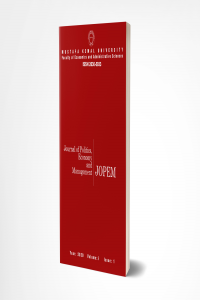A Research on the relationship between the manager’s power sources and the organizational entrepreneurship
A Research on the relationship between the manager’s power sources and the organizational entrepreneurship
Modern organization feature is perplexity and brilliancy, ambiguity and tradition ignorance and entrepreneurship for organizations that try to achieve persistence is the main role and many organizations try intensively to follow methods and techniques in order to improve efficiency and practically and flexibly. Hence, organizational entrepreneurship is rapidly going to be changed to a selective weapon for an organization, especially for great organizations. The purpose of this research is to evaluate the relation between the manager’s power source and governmental organization’s staff entrepreneurship. The analyzing method of this research is correlations and regression analysis. The population of the research includes all Miandoab city governmental organization staffs and the sample is 127 staff. The data gathering tool was used Power Source Questionnaire and Organizational Entrepreneurship Questionnaire. The result of this research showed that there is a direct and meaningful relationship between staff entrepreneurship and power source proficiency and there is a negative relationship between staff entrepreneurship and an obligatory power source.
Keywords:
Power Source, Organizational Entrepreneurship Proficiency, Authority,
___
- Archibong, C. (2004). Technology, infrastructure and entrepreneurship: Role of the government in building a sustainable economy. School of Business and Economics North Caroliana A & T State University.
- Bratnicki, M. (2005). Organizational entrepreneurship: Theoretical background, some empirical tests, and directions for future research. Human Factors and Ergonomics in Manufacturing & Service Industries, 15(1), 15-33.
- Fox, J.M. (2005). Organizational entrepreneurship and the organizational performance linkage in university extension. Doctoral Dissertation, The Ohio State University, Ohio, USA.
- Garcia-Morales, V. J., Llorens-Montes, F. J., & Verdú-Jover, A. J. (2006). Antecedents and consequences of organizational innovation and organizational learning in entrepreneurship. Industrial Management & Data Systems, 106(1), 21-42.
- Hadizadeh, A. (1998). Analysis multiple models and organizational policy. Management Study, 23, 24.
- Haqhshenas, A. (2007). Model of entrepreneurship in organization in Iranian governmental department. Management Journal, 2(8), 31-73.
- Hasan Zadeh, R. (2005). Cooperative management effect on implementation and innovation in organizations. Training Science Journal and Fields Related to Azad Islamic University of Roudehe, 1(1).
- Hjorth, D. (2005). Organizational entrepreneurship: With de Certeau on creating heterotopias (or spaces for play). Journal of Management Inquiry, 14(4), 386-398.
- Hjorth, D. (2012). Organizational Entrepreneurship: An Art of the Weak? In D. Hjorth (Ed.), Handbook on Organisational Entrepreneurship (pp. 169-190). Cheltenham: Edward Elgar Publishing.
- Human, H.A., Khosravi, A., & Aohrabi Nejad, N. (2005). Entrepreneurship assessment scale in governmental organization. Iranian Psychological Journal, (8), 267-276.
- Jelinek, M., & Litterer, J.A. (1995). Toward entrepreneurial organizations: Meeting ambiguity with engagement. Entrepreneurship Theory and Practice, 19(3), 137-168.
- Khenifer, S. & Vakiliy, A. (2008). Relation between the organizational structure type and entrepreneurship in small and middle economical organization. Entrepreneurship Journal, 1(2), 35-55.
- Morris, M. H., & Jones, F. F. (1999). Entrepreneurship in established organizations: The case of the public sector. Entrepreneurship Theory and Practice, 24(1), 71-91.
- Niyazi, C.A.N. (2007). Öğretmen liderliği becerileri ve bu becerilerin gerçekleştirilme düzeyi. Erciyes Üniversitesi Sosyal Bilimler Enstitüsü Dergisi, 1(22), 263-288.
- Nourbakhsh, M., & Mohammadi, S. (2004). The relationship between leadership styles and sources of power in faculty of physical education’ administrations view of faculty members. Harkat Journal, 19, 109-124.
- Rasekh, N. (2007). Determination of relation between cooperative management and entrepreneurship in Tehran University sport science. Unpublished Master Thesis, Tehran University, Tehran.
- Robbins, S.P., (2005). Organizational behavior (Trans. A. Parsaiyan, & M. Arabi, Fifth Edition). Tehran, Iran: Publisher Cultural Research Bureau [In Persian].
- Torabiyan, A., Amirhesam, H., & Leyly, S. (2006). Check the chemical composition of ferrous sulfate, ferric chloride, calcium hypochlorite the removal of hydrogen sulfide industrial wastewater. Environment Science Technology, 10(4), 56-59.
- Yadallahy Farsi, J. (2008). Evaluation of entrepreneurship inside the organization in governmental systems, case study of Khuzestan province agricultural system. Entrepreneurship Development Journal, 1, 171-206.
- Zareh, A. (2007). Evaluation of relationship between the psychological factors and experts’ rehabilitation and organizational entrepreneurship in country training organization. Sport Journal, 5(9), 71-81.
- ISSN: 2630-5933
- Yayın Aralığı: Yılda 2 Sayı
- Başlangıç: 2018
- Yayıncı: Hatay Mustafa Kemal Üniversitesi
